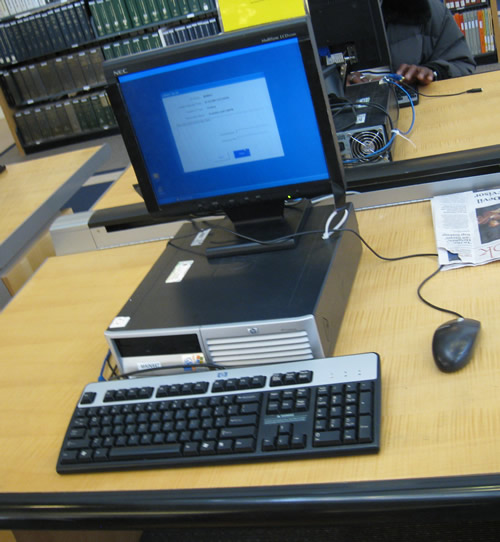
Millions of Americans are turning to the Internet to look for new jobs. But in many parts of the United States, public libraries are the only free provider of that crucial combo: a computer plus Internet access. This means that low-income job seekers depend on them when searching for employment. Oddly, as library development directors look for funds to beef up their networks, they're not finding the support they expected from the White House's $7.2 billion broadband stimulus package.
The first round of stimulus grants "in effect de-prioritizes libraries and discourages them from applying for funding," complains the American Library Association in a letter sent to the National Telecommunications and Information Administration. "The ability of our libraries to meet community needs is in jeopardy—especially when library use has heavily increased across the country in these difficult economic times."
Household snafu
As we've reported, the government has released its first Notice of Funding Availability (NOFA) for American Recovery and Reinvestment Act broadband grants and is asking for project proposals. Two agencies are handing out the money: the Department of Agriculture's Rural Utilities Service, and the NTIA's Broadband Technology Opportunities Program (BTOP).
It's the funding standards of the latter agency that are at issue here, in one crucial category: broadband infrastructure. Libraries everywhere can apply for BTOP Computer Center and Sustainable Broadband Adoption grants—the latter supports programs to encourage broadband awareness. The concern for ALA is with the conditions by which applicants can qualify for last and middle mile infrastructure projects that will boost a library's capacity to provide high speed service to patrons.
So what's the problem? First, says ALA, the NTIA's definitions of "unserved" and "underserved" areas—those being the regions eligible for grants—effectively screen out a lot of worthy libraries. To BTOP, "unserved" means regions consisting of one or more census blocks where at least nine out of ten households "lack access to facilities-based, terrestrial broadband service, either fixed or mobile, at the minimum broadband transmission speed." "Underserved" means places where half the households have no access, or areas with similar handicaps.
These household-based definitions have an "unintended consequence" for metro area libraries, ALA notes. Those "located in urban and suburban communities will be unduly penalized even though they are well-positioned to provide internet access via broadband connectivity to everyone in their community."
Always in use
Here's the problem, illustrated. Ask any big city librarian, and they'll tell you that while their region as a whole may be richly served with high speed Internet providers, their building is besieged by unserved people— unemployed women and men without access to broadband and/or computers. That's the case at the main branch of the San Francisco Public Library, which this writer often visits. Sure, householders in this neck of the woods can get Comcast or AT&T DSL, or even Verizon VZAccess off their Blackberry. But that assumes that they haven't lost their job and aren't broke besides. Lots of newly unemployed people are keeping their broadband accounts no matter what. But for those who can't, the library provides one hour computer/Internet connections. Rarely is a station unoccupied.
"If we had twice as many computers as we have now, they would be full all the time," Susan Cohen, SF Main Branch Jobs and Career Librarian told us. "The computers are always in use." In fact, library patronage has jumped since last October, when the economy started taking a serious downturn. The sheer number of people sitting in the building has grown, we've noticed. And staffers say that library attendants are almost overwhelmed by the number of books they have to return to the shelves.
Many of these newly unemployed patrons are either looking for jobs or business opportunities, Cohen says. And many jobs require a Web-based application. "You used to be able to just walk in and apply," she noted. "Now you have to do it online." That has put more pressure on job hunters to find computers, and more pressure on the library to help them.
Demand for the main branch's computer network has so increased that the library has set up a special center where San Franciscans can access a terminal for up to four hours, enabling them to do more job hunting research or write a full resume. The center is always running at capacity, we were told, helping about sixteen people a day.
San Francisco is not alone in facing these challenges. ALA research indicates that seven out of ten libraries represent the only resource for gratis computer/Internet access in their areas. Almost all libraries provide some kind of access at no charge.
Minimum upgrade
ALA is also a bit miffed that the BTOP grant conditions adopt a "single definition of broadband" (768 kbps downstream minimum) that doesn't offer extra points to libraries that want to offer faster speeds. "Therefore, service providers are not incentivized to build broadband networks to libraries (or other community anchor institutions)," ALA writes. "Points should be awarded to applicants (including service providers) that apply to build out high-speed broadband connectivity to libraries."
And, of course, the Association wants libraries exempted from those unserved/underserved household definition requirements for future grant application windows. There are two more coming before all the stimulus money is awarded. Since round one winners will be notified starting in September, round two might not start until next year. All the BTOP grants have to be in the hands of successful applicants by September 2010; it's a little over four billion dollars, all told.
reader comments
20